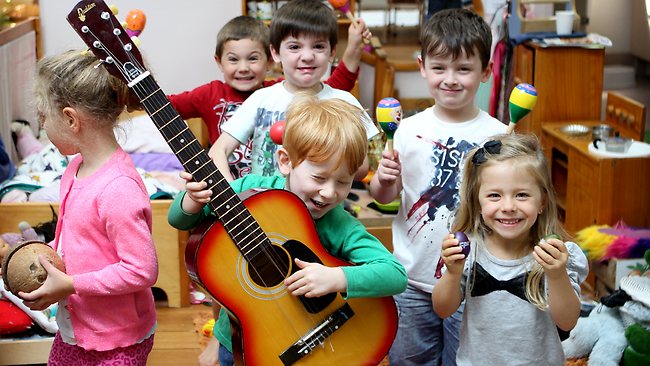Music and young children have a special and meaningful relationship. From a very early age, children are naturally drawn to music and are deeply influenced by its rhythms, melodies, and lyrics. Music plays a significant role in their development, impacting various aspects of their lives, including cognitive, emotional, social, and physical growth.
Music is a universal language that has the power to transcend cultural barriers and connect people on an emotional level. Beyond its artistic appeal, studying music also offers a myriad of benefits, particularly for young children. Engaging in musical activities at an early age can have a profound impact on a child’s cognitive, emotional, social, and physical development. This blog explores the various ways studying music benefits young children, nurturing their overall growth and enriching their lives.
Cognitive Development: Studying music is like a full-body workout for the brain. Learning to play an instrument or read music involves processing complex auditory and visual information simultaneously. This process enhances cognitive abilities, including memory, attention, and spatial-temporal reasoning. Numerous studies have shown that musically trained children tend to perform better in academic subjects like mathematics and language arts, thanks to the cross-disciplinary cognitive skills developed through musical training.
Emotional Expression and Regulation: Music provides a unique channel for emotional expression and regulation. Through music, children can convey their feelings and emotions without the need for words. Playing or listening to music can also help young children regulate their emotions, reduce stress, and promote relaxation. The ability to connect with and understand their emotions fosters emotional intelligence, enabling children to navigate social interactions more effectively.
Motor Skills and Coordination: Learning to play musical instruments involves the development of fine and gross motor skills. Playing instruments like the piano, violin, or drums requires precise finger movements and hand-eye coordination. Even activities like clapping, dancing, or conducting contribute to the refinement of motor skills and physical dexterity.
Language Development and Communication: Musical experiences stimulate language development in young children. Singing nursery rhymes, learning song lyrics, and listening to music with diverse vocabulary expand a child’s language repertoire. Music also helps with pronunciation, enunciation, and phrasing, aiding in verbal communication skills.
Creativity and Imagination: Music is an avenue for creative expression, allowing children to explore their imagination and artistic inclinations. Improvisation and composition provide opportunities for young musicians to create original melodies and experiment with various musical elements, fostering their creativity and innovation.
Discipline and Patience: Learning music requires commitment, discipline, and patience. Regular practice and perseverance to overcome challenges teach young children the value of hard work and dedication. The process of mastering an instrument instills a sense of accomplishment and builds resilience in the face of setbacks.
Social skills and Collaboration: Playing music in groups or ensembles encourages teamwork and collaboration. Children learn to listen to others, adjust their playing to complement the group, and work towards a unified musical performance. These experiences promote social skills and a sense of camaraderie.
Cultural Awareness and Appreciation: Exposure to different styles of music from various cultures fosters cultural awareness and appreciation in young children. Understanding and embracing diverse musical traditions promote tolerance and respect for other cultures.
Boosts Self-Confidence: Performing music in front of an audience, whether in a small group or during a recital, boosts a child’s self-confidence. The positive feedback and sense of accomplishment derived from successful performances contribute to a healthy self-esteem.
Provides a Lifelong Hobby and Passion: Studying music at a young age can ignite a lifelong passion for music and hobby. Children who are exposed to music early on are more likely to continue playing and enjoying music as they grow older, providing them with a rewarding and fulfilling pursuit throughout their lives.
Parent-Child or parent- Teacher Bonding: Music offers a wonderful way for parents and teachers to bond with their young children. Singing lullabies, dancing together, or simply enjoying music as a family or group strengthens the parent-child and Teacher-child relationship and creates cherished memories.
Stress Reduction and Relaxation: Listening to soothing music or engaging in calming musical activities can help reduce stress and promote relaxation in young children. Music has the power to create a serene and calming environment, which is particularly beneficial during times of anxiety or restlessness.
Conclusion
The relationship between music and young children is one of immense significance. Music enhances cognitive development, emotional expression, and social skills while promoting creativity, relaxation, and cultural awareness. From the earliest stages of life, children are drawn to the magic of music, and harnessing this innate connection can have a profound impact on their overall growth and development. As parents, educators, and caregivers, we have the opportunity to enrich the lives of young children through the joy and beauty of music, creating a nurturing and stimulating environment that encourages their exploration and appreciation of this universal language.

